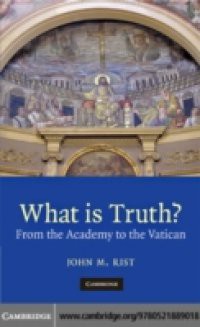This book studies the nature, growth and prospects of Roman Catholic culture, viewed as capable of appropriating all that is noble both from internal and external sources. John Rist tests his argument via a number of avenues: man's creation in the image of God and historical difficulties about incorporating women into that vision; the relationship between God's mercy and justice; the possibility of Christian aesthetics; the early development of the see of Rome as the source of an indispensable doctrinal unity for Christian culture; the search for the proper role of the Church in politics. He also argues that such an understanding of Catholic culture is necessary if contemporary assumptions about inalienable rights and the value of the human person are to be defended. The alternatives are a value-free, individualist universe on the one hand, and a fundamentalist denial of human nature and of history on the other.

